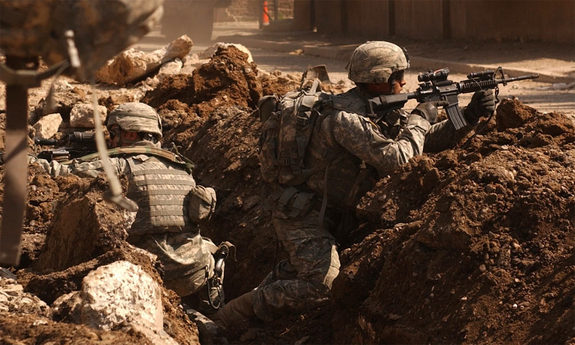Why Peace Is So Tricky for Humans

Like our close living relatives, chimpanzees and bonobos, humans are hardwired come into conflict with one another, often violently. Even so, like our ancestors, we also have the capacity to resolve fights; something that one anthropologist says has evolved along with our societies over the millennia.
We still have a way to go, he points out. The current system we have in place for dealing with large-scale conflict — the United Nations — is inadequate, suggests researcher Christopher Boehm who has contributed one of several essays on human conflict published in the May 18 issue of the journal Science.
"The genes are still making us do the same old things, which include quite a bit of conflict. Culture has given us solutions at various levels," said Boehm, of the department of biological sciences and anthropology at the University of Southern California, in a podcast released by the journal Science. "But the world conflict-resolution system still needs quite a bit of work." [The Evolution of Fighting]
While for the most part, national governments are fairly good at coping with internal conflicts, the UN's ability to intervene in conflicts is severely hampered, because, for example, permanent members of its Security Council are able to veto a resolution, he said.
Deep roots
The role of third parties like the UN in resolving conflicts appears to have deep evolutionary roots. The common ancestor for humans, chimpanzees and bonobos appears to have lived in a social dominance hierarchy, a structure that leads to conflict between individuals and groups, Boehm concluded by looking at behaviors shared among the three species today. (Bonobos appear less conflict-prone than chimpanzees and human hunter-gatherers.)
Often, fighting bonobos or chimpanzees will resolve the conflict themselves, but when this doesn't happen, a third party sometimes steps up.
Get the world’s most fascinating discoveries delivered straight to your inbox.
"One way this happens for chimpanzees and occasionally bonobos is simply a power figure threatens the two who are fighting and gets their attention and makes them stop," Boehm said.
To get an idea of how hunter-gatherers living about 45,000 years ago dealt with conflict, Boehm looked to modern hunter-gatherer societies. [The Awá Gallery: Faces of a Hunter-Gatherer Tribe]
While humans at this time retained the capacity for violent conflict shared by their ancestors, the dynamics had changed. Humans had an understanding of death and they had weapons. They temporarily lost the alpha-male role and became more egalitarian, living in small bands; they also became moral, following rules because group values support them, rather than simply out of a fear of power, Boehm writes.
Hunter-gatherers have high rates of homicide, comparable to those of a large modern city, he said. Their egalitarian social structure, however, means there is no strong figure to intervene in fights, so people often try to head off a fight before it starts, he said.
Evolving solutions
But the loose social structure also offers a solution; those involved in conflicts can join a new band far away. This changed in time.
"Our cultural evolution has involved living in much more large and dense populations, and with larger populations come a greater need for command and control at the political center," he said.
Because moving away is no longer an option for them, tribal farmers grant some authority to a chief, allowing him to stop conflicts. Over time, this trend toward centralized power continued, chiefdoms turned into kingdoms, which led to early states and eventually modern nations.
Conflict management could then be delegated to police, courts and political figures, and in some cases, armies could intervene.
As for conflict between groups (rather than within them), humans, like chimpanzees, and bonobos to a lesser degree, fight with their neighbors. In the modern world, nations devote considerable resources to preparing for war, and small wars are waged frequently. However, like hunter-gatherers, nations can use truces and treaties to resolve them, Boehm writes.
Do you think world peace is possible?
"In the foreseeable future, the human capacity for political problem-solving will continue to be tested, with an ancient capacity for conflict management providing an important tool in international politics," he writes.
You can follow LiveScience senior writer Wynne Parry on Twitter @Wynne_Parry. Follow LiveScience for the latest in science news and discoveries on Twitter @livescience and on Facebook.



